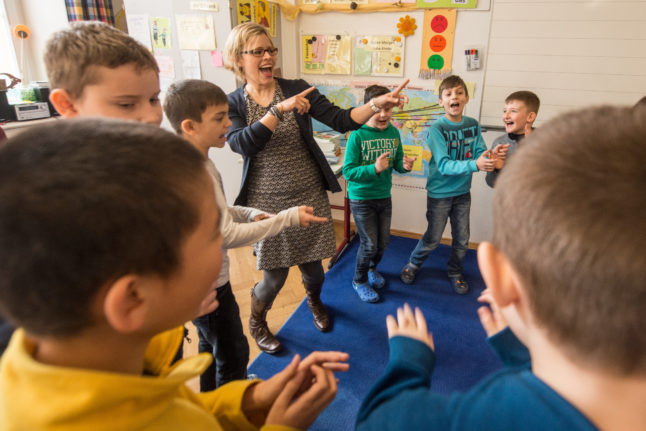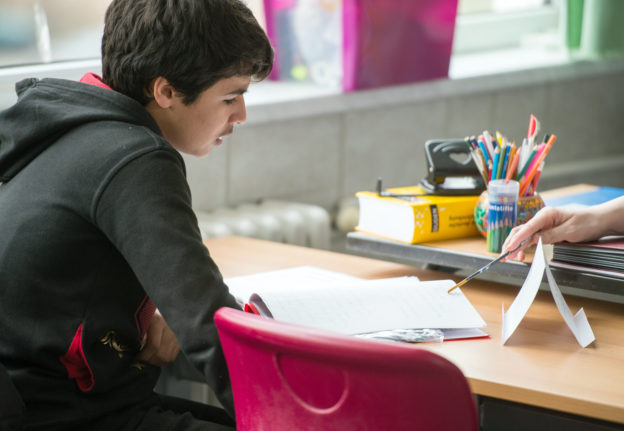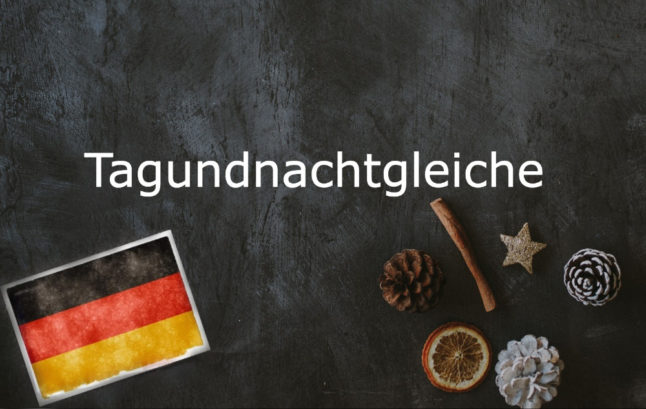It’s in everyone’s interest that people living in Germany are able to speak the language.
Though German has a reputation for being difficult (just check out all the different words they have for “the”!), being proficient can open up doors to new career opportunities, help you make friends and generally make living here that little bit easier.
Sometimes, however, the cost of taking a language course can be a major barrier. That’s why it’s important to know whether you or your family may actually be entitled to take a heavily subsidised or free German course.
Here are the main groups of people who can take free German classes in Germany, and some other options for those who aren’t eligible.
READ ALSO: How I stopped worrying and learned German in six months
Asylum seekers and refugees
Even before asylum seekers have received a verdict on their application, they are entitled to take what’s known as an Erstorientierungskurs: a course of initial orientation. This free course can help them get to grips with the basics of the language and day-to-day life in Germany, including modules on housing, work, shopping, transport, and health.
Once an application for asylum is accepted, refugees are granted a free place on an integration course (Integrationskurs) to help improve their language level further and understand more about German life and culture.
Nearby courses can be found through the Federal Office for Migration and Refugees (BAMF) website. Refugees and migrants normally have to receive a permit (or “Berechtigungsschein”) to attend the course via the Foreigner’s Office.
It’s worth noting that most migrants – even if they are not refugees – are entitled to take integration courses through BAMF, but they generally have to pay for them.
READ ALSO: The 5 best free apps for learning German for all levels
Jobseekers
Long-term unemployed people who are receiving Hartz IV (or Arbeitslosengeld II) can usually take German language and integration courses funded by the Jobcenter.
In some cases, the Jobcenter will also provide expenses for travel to and from the language school. Unemployed people who want to take a language course should speak to their advisor to find out the options available and how to sign up for a course.
You can also find a list of German courses financed by the Federal Employment Agency on the Kursnet Arbeitsagentur website. These include different language levels, integration courses, and special courses known as ‘German for Professional Purposes’ (ESF-BAMF), which are designed to equip you for working in Germany.

Ethnic German Resettlers
German law entitles ethnic German resettlers and their families (spouse and children) to attend an integration course free of charge. Like jobseekers, this group of people can also apply to have their travel costs to and from the language school reimbursed by the state.
The best way to sign up to a course is to find your nearest school on the BAMF website and consult with the school directly about your eligibility for funding. They should be able to advise you further about your rights.
READ ALSO: EXPLAINED: How to pick the right German language school for you
Prospective and current students
German universities generally require evidence of C1 language skills when admitting students from non-German speaking countries into their courses. Some prospective students will need to take the TestDaF exam as proof of their language schools, and can occasionally find exam preparation courses for free. To find a list of schools in your area, it’s best to look on the Fachverband für Deutsch als Fremd- und Zweitsprache (German as a Foreign or Second Language Association) website.
Refugees are also usually eligible to take language courses in preparation for university study for free, which are often funded by schemes such NRWege (Paths to Studying) in North Rhine-Westphalia.
Most universities also offer free-of-charge language courses for students already taking a university course in another language. To find out about these, it’s best to consult the language centre of your university or college directly.
Children and young people
As part of their general education in German, children from migrant backgrounds receive special support in mastering the German language. This can start as early as kindergarten and carry on alongside their studies as primary and secondary school, with tests along the way to keep track of progress.
Once children have finished school, they may be entitled to a free place on an integration course for young people, which can once again be booked through BAMF.

There are also various charitable organisations in Germany that provide funding for language courses, such as the Otto Benecke Stiftung e.V. Higher Education Guarantee Fund, which is aimed at young people from a migrant background.
Though the Higher Education Guarantee Fund, young migrants can not only have their qualifications recognised or receive support to access higher education, but can also gain access to free German classes if their language skills need improvement.
Other options
If you don’t fit into any of the above groups, don’t despair: there are still plenty of options for learning German for free or on a budget in Germany.
In some cases, your employer may be willing to fund you to attend a German course as part of your professional development. Otherwise, you can find plenty of free online courses such as Ich Will Deutsch Lernen, Deutsch Akademie and the Goethe Institute. For a great list of self-study resources, check out the RU Geld website, or check out our article below on the best ways to learn German for free:
The best ways to improve your German for free



 Please whitelist us to continue reading.
Please whitelist us to continue reading.
Member comments